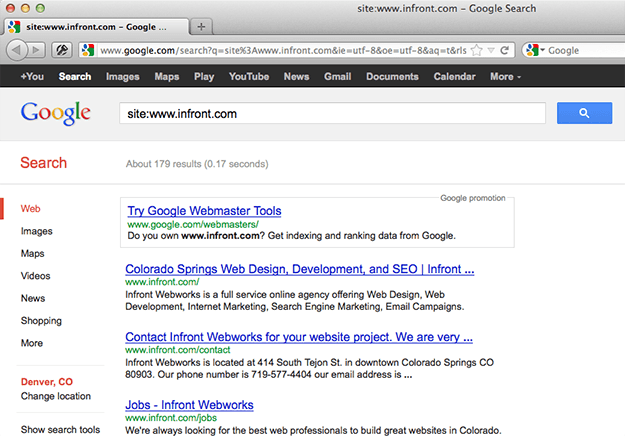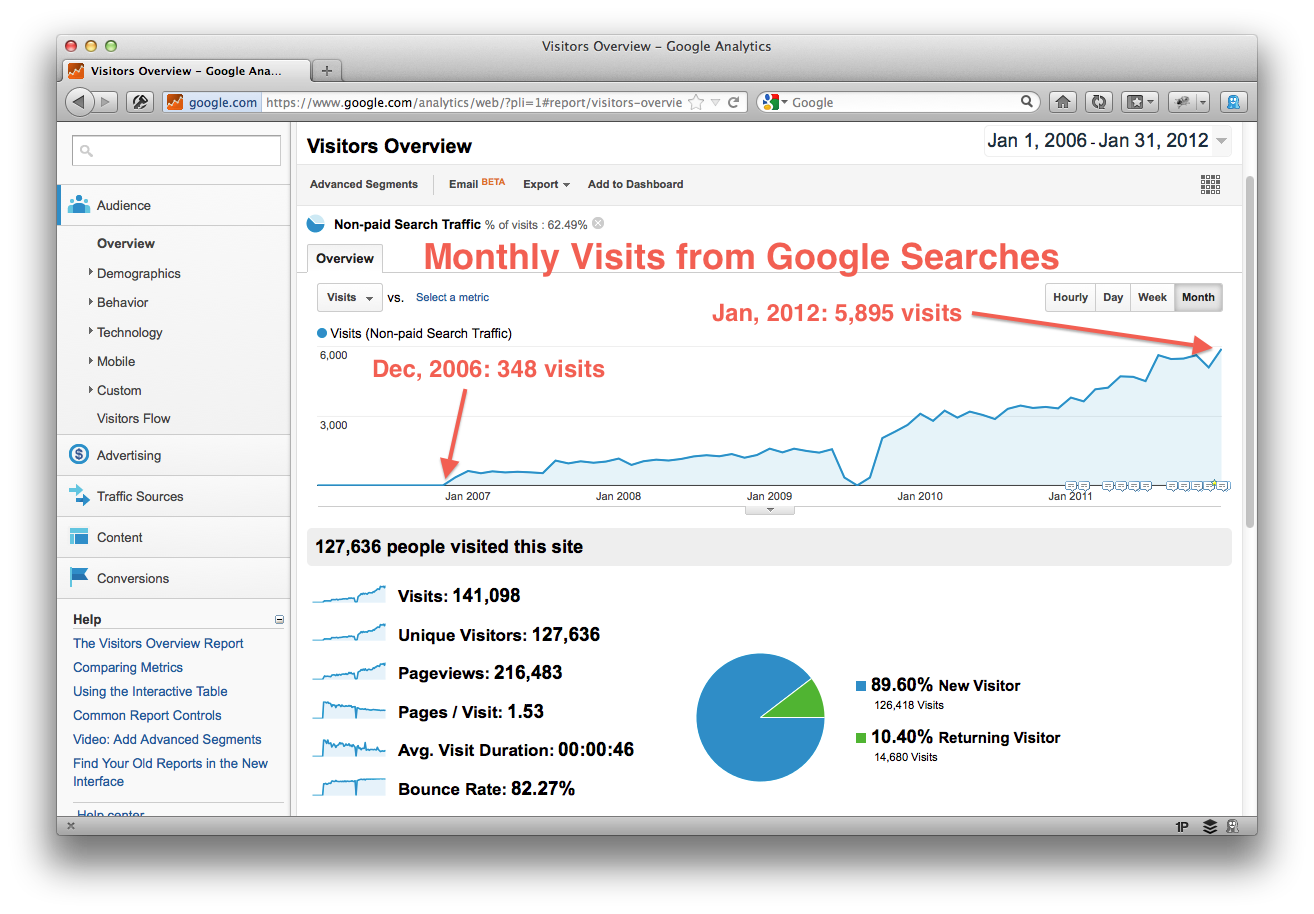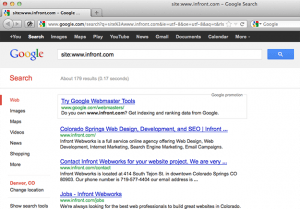Something I frequently hear from companies that want to do Internet Marketing is “My website doesn’t show up in Google. Why is that?” Or sometimes they’ll say, frustratedly, “Why do I not show up as the number one result when I Google my company name?” Take, for example, the dentist I spoke with a few months ago who said “When I Google ‘dentists,’ I don’t show up on the first page. Why not?“
These questions are perfectly fair, but they’re loaded and have complicated answers. Here’s the simplest way to explain what’s going on: if you literally can’t find your website anywhere in a Google search for any keywords at all, your website may not have been indexed by Google, so let’s address that first. Google has a “search engine spider” called “Googlebot” that goes out and “crawls” the web looking for websites. In plain English, this means Google has a bot that runs proprietary software that searches the web looking at all the websites it can find and ranks them in order of importance in an index. If Googlebot has already found your website, your website will be listed on a search results page. If you’ve had a website up and running for a while can’t find it anywhere, there may be a mechanical problem.
Why am I not showing up in Google?
To diagnose your website and see if there’s a mechanical problem, visit www.google.com and type in the following phrase without any spaces: “site:www.infront.com” and hit the search button. (Obviously, you’ll want to put your actual website in here instead of the example I used). In this case, when I run a search on https://www.infront.com, here’s what I see:

You’ll notice that right under the search box, in grey, it says “About 179 results (0.17 seconds).” This tells me that Google has indexed approximately 179 pages on our website and it took Google 0.17 seconds to search its index and show me the results. This means Googlebot has found our website, liked what it saw, and decided to store almost 200 pages from our website in its index. This is great!
If you run this kind of report to see if your website has been indexed in Google and the results come back with absolutely zero links, you’ll know that Google has not indexed your website. If that’s the case, it usually means one of four things:
1) Your website is completely built-in Flash or another media type that isn’t crawlable (although some types of Flash sites are). In this case, Googlebot may have found your website but may have given up on trying to index it because it can’t read the content.
2) You have a command in your website’s robots.txt file (a tiny little text file that sits on your server) that specifically tells your server to hide all of your web pages from search engine spiders. This happens sometimes by people who initially set up a website and don’t really know what they’re doing… it’s a rookie mistake, and it happens.
3) Your website’s pages have a “noindex” command in a meta tag in the head section of the page. Just like the robots.txt file example above, this explicitly tells a search engine NOT to index your web pages. This is also a rookie mistake.
4) The final, and most likely, reason is that you have a brand new website that has just launched. Generally speaking, if you’ve just launched a website, Googlebot will come and find it automatically, and you don’t even have to do anything… but it takes its sweet time to do so. It can take weeks or even months unless you actively participate in building some links to the website and sending some traffic to it.
If you have one of the first three technical issues, feel free to contact us and we can take a look for you and let you know for sure what the problem is. If you have the fourth problem, you can just wait and Google will most likely find it at some point. But if you don’t want to wait, there are ways to help speed up the process significantly, and that’s all part of my job here at Infront. We can help you with that as well.
So if you’re sure don’t have a mechanical problem, let’s address the second question.
Why am I not number one in Google?
One of the great misconceptions about websites is the underlying assumption “if you build it; they will come.” This is simply not true. Aside from the initial crawl that Googlebot will automatically do when it first finds you while scouring the internet, users are not going to find you as easily. Once you launch a website, you have to work to drive traffic to it. And that takes time… lots of time. Using my favorite example—our website—just take a look at the screenshot of our analytics over the past six years:

You can see how in December of 2006, www.infront.com only received 348 visits from people who were using Google to search for website design companies, and in January of this year, we received 5,895 searches. Right now, if you Google “colorado springs web design,” “web development colorado springs,” or just about any other related phrase, www.infront.com will show up as the number one search result. …but it took us SIX YEARS to get there. We’ve seen a 1,593% increase in our monthly visits from Google organic (“free”) search results since we started optimizing our website, but again, it took us over half a decade to get there.
Google’s search results pages are incredibly competitive real estate—if you want to rank highly for search terms related to your industry, you’re going to have to do some serious Search Engine Optimization (SEO) to get the kind of traction you need to outrank your competitors. You can’t build a four-page static website with only a few paragraphs of content and expect to show up on search results pages a week later, much less show up in the first spot for a competitive term!
If you want to rank number one for a very specific search term, you have to first figure out exactly which term you want. For example, you will see a different result for each of the following search terms: “Colorado springs hot tubs,” “hot tubs,” “hot tubs in Colorado springs,” and “Colorado hot tubs.” They may all look similar and you may think that the results should be the same or nearly the same for all of them, but that’s just not the case. Most searches have a drastic difference in the results for even the most minor differences in a search term. “Web design company” will return a different result than “web design companies” will. And there’s a difference between “family lawyers” and “family attorneys.”
Next, you have to identify just how competitive a search term is. There’s a whole lot more competition for “mechanics in colorado” than there is for “honda warranty repairs in colorado springs colorado that is open on Saturdays,” for example. For the most part, you want to go where the traffic is. There are software packages that we (and other SEO companies) use to identify the biggest opportunities for a particular industry, and we can tell how many people search a particular phrase, as well as how competitive that phrase is.
Remember above where I said that Google ranks websites “in order of importance”? That one word—importance—is the key factor here. (Search engine companies refer to this as relevance.) A search engine gets to decide which pages are the most relevant for a specific search phrase. You do not get to decide. Just because you think your company is the best in your industry doesn’t mean the search engines agree with you. Actually, they often don’t. If you’ve just launched a website, the odds are you’re now just starting to compete with companies that have been marketing online for years, and you won’t be able to unseat them overnight. If you want to increase your rankings for specific search phrases, you need to do some serious SEO, over time.
There’s a LOT more that can be said on this topic, but I’ll save that for another time. For now, just know that you need to make sure your website is crawlable in order to have it indexed by Google and that increasing your search engine rankings takes time.

Matthew is the President of Infront Webworks and is a New England native now calling Colorado Springs home. Matt attended The University of NH where he pursued a BS in Natural Resource Economics & Business Administration. Aside from Infront; Matthew has owned and managed two other online agencies based on the seacoast of New Hampshire and been a key player in multiple technology mergers & acquisitions. When he’s not bathing in technology, online marketing & business; he’s probably spending time with his wife and daughter, boating, skiing the trees, hiking or cooking..he is a foodie for sure!


